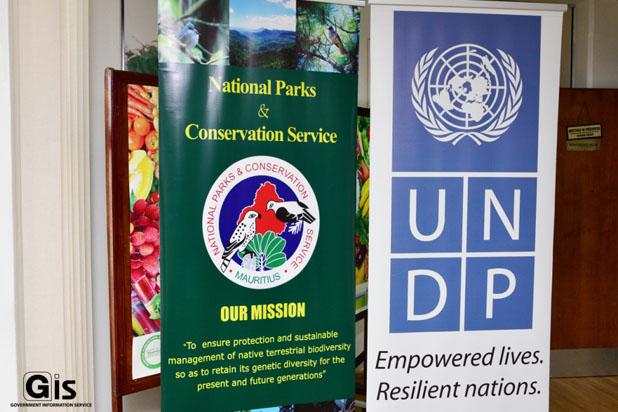Africa-Press – Mauritius. A two-day online inception workshop on the project “Mainstreaming Invasive Alien Species (IAS) Prevention, Control and Management”, at the initiative of the Global Environment Facility (GEF) United Nations Development Programme (UNDP), the Ministry of Agro-Industry and Food Security, and the National Parks and Conservation Service, opened this morning in Port-Louis.
The Attorney General and Minister of Agro-Industry and Food Security, Mr Maneesh Gobin, was present. The project is funded to the tune of some USD 4 million under the GEF for which an agreement was signed in August 2019 between the Ministry of Agro Industry and Food Security and the UNDP.
The objective is to safeguard globally significant biodiversity in vulnerable ecosystems, through the prevention, control, and management of IAS in the Republic of Mauritius.
Some 40 participants are attending the online workshop. In his opening remarks, Minister Gobin highlighted the need to protect the biodiversity hotspot in the Republic of Mauritius, which he added, is an asset for ecotourism.
He recalled that despite the difficult situation in the face of the COVID-19 pandemic, Mauritius is working in close collaboration with the UNDP to come up with concrete measures aimed at protecting endemic species against the IAS.
The Minister also expressed his commitment as Attorney General to reinforce the law by bringing amendments to the legislations so as to have better control and detect IAS at the different points of entry in Mauritius such as the port and the airport.
For his part, the National Project Director, Director National Parks and Conservation Service, Mr Kevin Ruhomaun, spoke about the impact of the IAS on the biodiversity, which he said, will cause a nuisance as to the growth of the endemic species in the Republic of Mauritius.
He also dwelt on the devastating nature of the IAS while adding that the workshop will help devise the appropriate measures to tackle the problem of IAS.
The UNDP representative, Senior Economist, UNDP Mauritius and Seychelles, Mr Tony Muhumuza, in his online intervention, expressed satisfaction as to the kick-start of the project with the inception workshop where participants will come up with concrete recommendations to deal with the IAS.
He reiterated the continuous support of the UNDP to the Republic of Mauritius in carrying forth the project towards its complete implementation. About the Project
The “Mainstreaming Invasive Alien Species Prevention, Control and Management” project will cater for several features pertaining to the protection of the biodiversity in the Republic of Mauritius.
They are: restoring the Native Biodiversity ecosystem by removing IAS in Mauritius and Rodrigues; enhancing methodology developed to counteract pest and diseases in in vegetables, fruit and sugar cane plantation; mitigating climate Change; positive impact on ecotourism; updating existing strategies to prevent IAS Entry and further negative impacts; harmonising of the legislative, policy and institutional framework; increasing capacities to prevent, control, eradicate or manage IAS effectively; as well as local communities In Rodrigues.
The Project will focus on three components, namely: creating the policy and institutional frameworks for effective prevention, control and management of IAS to secure ecosystem goods and services under pressure from IAS; establishing a multi-tier strategy for effective tackling of IAS such as improved preventative measures at points of entry into the country and inter-Islands, early detection and rapid response programmes to eradicate new incursions; and up-to-date information for raising public awareness and enhancing understanding of the centrality of IAS programmes for protecting biodiversity, ecosystems, the economy, and livelihoods.







